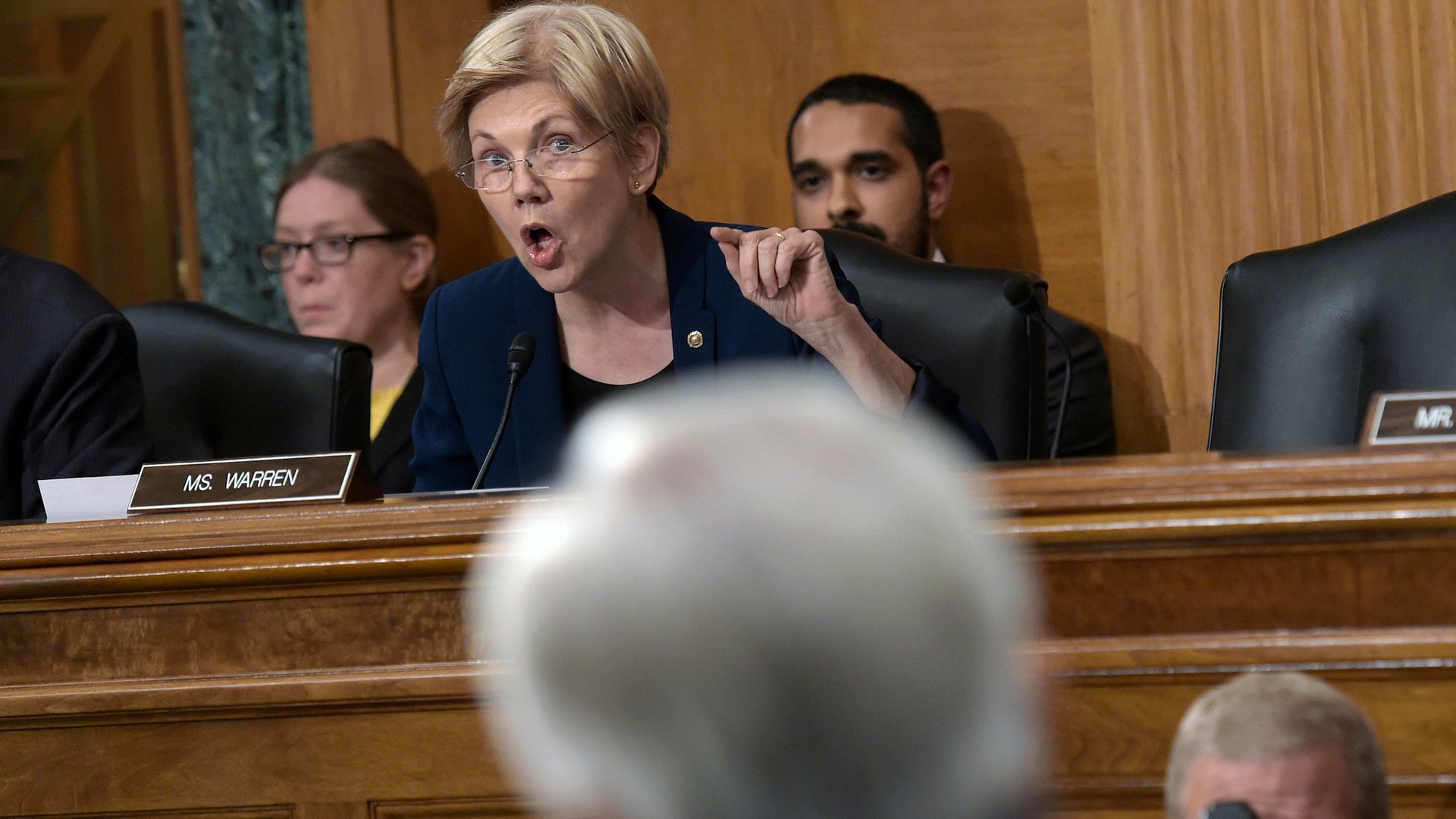The Wells Fargo fake account scandal proves “there’s no such thing as a good big bank”
Wells Fargo was supposed to be the nice bank. For years, it’s leaned into a folksy image, presenting itself as a beacon of stability—disinclined to make waves—that avoided the worst of the behaviors that led to the mortgage meltdown. One fawning profile from early 2015 briefly compared the bank’s chief executive, John Stumpf, to Jimmy Stewart, who famously played hometown banker George Bailey in It’s a Wonderful Life.


Wells Fargo was supposed to be the nice bank. For years, it’s leaned into a folksy image, presenting itself as a beacon of stability—disinclined to make waves—that avoided the worst of the behaviors that led to the mortgage meltdown. One fawning profile from early 2015 briefly compared the bank’s chief executive, John Stumpf, to Jimmy Stewart, who famously played hometown banker George Bailey in It’s a Wonderful Life.
No one will be making that analogy again anytime soon.
The news that Wells Fargo employees have for years been opening fake accounts on behalf of customers in order to inflate sales figures has provoked widespread fury. Thousands of employees have been fired for opening more than two million dubious accounts. The bank will also claw back millions of dollars already paid out to Stumpf and Carrie Tolstedt, the bank’s former head of retail banking. At last week’s hearing before the Senate Banking Committee, US senator Elizabeth Warren urged Stumpf to resign. Even HBO talk-show host John Oliver is wading into the fray.
All of which raises the question: With scandal enveloping the last plausible “good” big bank, will Wells Fargo, JPMorgan Chase, Bank of America and the other industry titans soon face another public reckoning?
It’s easy to understand why the Wells Fargo fiasco has attracted so much public outcry. Compared to the financial crimes that have grabbed headlines over the past several years, the wrongdoing here is pretty straightforward. This isn’t a case of manipulating complicated interest rates, like the Libor issue, or even a problem of a multi-billion-dollar investment gone wrong, as seen in the London Whale debacle. There’s no talk of collateralized debt obligations or the packaging of mortgage-backed securities.
Instead, Wells Fargo’s high-pressure sales quotas sent low-paid customer reps scrambling to meet unachievable growth goals. You don’t need training in finance or even a thousand-word “explainer” to understand how the incentives might go sideways on that one.
The scandal doesn’t necessarily disabuse Wells Fargo of its Main Street image. The bank does concentrate most of its activity on consumer accounts, mortgages, commercial lending, and the like. But the fake-accounts scheme does show that a focus on bread-and-butter banking alone may not be enough to stem the tide of bad behavior.
“If there was any perception before that these guys were flying above the fray, I think that’s been shattered,” said Jason Ware, chief investment officer and chief economist at Albion Financial Group in Salt Lake City, Utah.
To be fair, there had been some troubling signs that Wells wasn’t quite living up to the down-home, aw-shucks image it sought to portray. But investors have historically flocked to the bank due to its reputation and strong earnings. The firm grew to be the world’s largest in terms of market capitalization, worth more than $300 billion at one time.
Since news of the problematic accounts broke, stock prices have fallen. Stumpf’s decision to give up $41 million in unvested stock looks unlikely to appease lawmakers. There also seems to be a growing consensus among politicians and regulators that, much as big banks may try to differentiate among themselves, they all require tough oversight and a heavy dose of skepticism.
“There’s no such thing as a ‘good’ big bank after the financial crisis,” said Robert Jackson Jr., a professor of law at Columbia University. “What we have are big banks that deserve a significant amount of scrutiny in the way that they are run, and Wells Fargo, Citibank, nobody should expect to be exempted from this.”
There’s an adage on the left, popularized by Warren, that “banking should be boring.” But even the self-proclaimed boring bank has shown that it will look the other way to meet the go-go expectations of the market.
If boring banking isn’t enough to quash wrongdoing, expect lawmakers to demand alternatives—ones that the big banks almost certainly won’t like any better. In a campaign season where both political parties have called for breaking up the big banks, Wells Fargo’s latest misstep is bad for all of the largest institutions. Regulators have already said they’re investigating whether other banks have problems with bogus accounts. And the scandal will undoubtedly spur fresh debates in Washington about the problem of banks that are “too big to manage.”
All this may well embolden big bank critics who have called for chopping them up altogether. Whether or not those threats ever come to fruition, the sloppy behavior exhibited by Wells managers has brought banking under even more political fire. For an industry in desperate need of a new public narrative, the downfall of the last “good” big bank simply underscores the stickiness of the same old story.